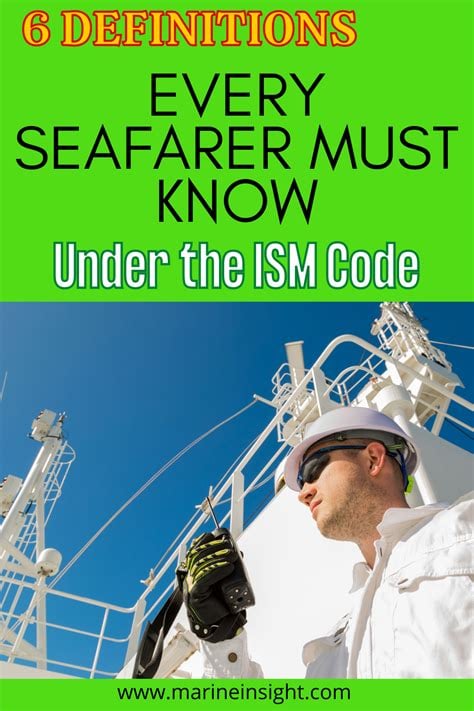
- The Complete Guide to ISM Maritime Law
-
FAQ about ISM Maritime Law
- What is the ISM Code?
- What are the main requirements of the ISM Code?
- Who is responsible for implementing the ISM Code?
- What are the benefits of implementing the ISM Code?
- What are the consequences of non-compliance with the ISM Code?
- Does the ISM Code apply to all ships?
- How does the ISM Code differ from other maritime safety codes?
- How can I find out more about the ISM Code?
- What is the difference between the ISM Code and ISO 9001?
- Is the ISM Code effective?
The Complete Guide to ISM Maritime Law

Introduction
Ahoy there, mateys! Welcome to the vast ocean of ISM maritime law. In this buccaneering missive, we’ll haul ye through the murky waters of this legal code that be governin’ the safety of sea dogs and their vessels. So, batten down the hatches, hoist a pint, and let’s dive right in!
ISM code, or if ye prefer the proper moniker, the International Safety Management Code, be an international set of regulations that aim to keep ships sailin’ safe and spick-and-span. It be applicable to all vessels over 500 gross tonnage engaged in international voyages, and it sets forth a framework for ships to develop and implement a Safety Management System (SMS). This SMS be like a nautical compass, guiding the ship and its crew towards safe havens.
A Deep Dive into the ISM Code
1. Safety Management System: The Captain’s Helm
The Safety Management System (SMS) be the heart and soul of ISM maritime law. It be a structured and documented system that ensures that all aspects of ship operation, from navigation to maintenance, be carried out in a safe and efficient manner. The SMS must be tailored to the specific ship and its operation, and it must be reviewed and updated regularly.
2. Master’s Responsibility: The Skipper at the Wheel
Under ISM maritime law, the master of the ship be ultimately responsible for the safety of the ship and its crew. The master must ensure that the SMS be implemented and followed, and that all crew members be properly trained and qualified. The master also has the authority to make decisions that affect the safety of the ship, even if those decisions go against the wishes of the company.
3. Company’s Role: Shaping the Course
The company that owns or operates the ship also has a duty to ensure that the ISM Code be followed. The company must provide the resources and support necessary for the master to implement and maintain the SMS. The company must also ensure that the crew be properly trained and qualified.
Implementation of ISM Maritime Law
1. Certification: The Stamp of Approval
To prove that they be in compliance with the ISM Code, ships must obtain a Document of Compliance (DOC) from a recognized organization. This organization will audit the ship’s SMS and ensure that it meets the requirements of the ISM Code.
2. Verification: Haul Out the Scrutinizing Glass
Once a ship has been certified, it be subject to regular verification audits by the recognized organization. These audits ensure that the ship continues to meet the requirements of the ISM Code.
3. Enforcement: Walk the Plank of Penalties
Ships that fail to comply with the ISM Code may be subject to penalties, including fines and detention. In some cases, the master or other crew members may also be held criminally liable.
Table: Key Components of an ISM Maritime Law Compliance Framework
| Component | Description |
|---|---|
| Safety Management System (SMS) | Documented system that outlines the ship’s safety procedures and responsibilities |
| Document of Compliance (DOC) | Issued by a recognized organization to certify that the ship meets the requirements of the ISM Code |
| Verification Audits | Regular audits conducted by the recognized organization to ensure that the ship continues to meet the requirements of the ISM Code |
| Enforcement Actions | Penalties, fines, or detention imposed on ships that fail to comply with the ISM Code |
Conclusion
In the treacherous waters of the maritime industry, ISM maritime law be the lighthouse that guides ships towards safe harbors. By implementing and enforcing the ISM maritime law, we can ensure that seafarers and their vessels brave the waves with confidence, knowing that they be protected by a robust framework of safety regulations. So, let’s hoist a cheer to ISM maritime law, the guardian of our maritime realm!
Looking for More Nautical Wisdom?
If this article has whetted your appetite for maritime knowledge, then shiver me timbers, we have a treasure trove of other articles that be sure to set your sails a-flutterin’. Check ’em out below:
- [Avast There! A Beginner’s Guide to Maritime Law](link to article)
- [The Seven Seas of Maritime Safety](link to article)
- [Navigating the Legal Waters: A Deep Dive into Maritime Law](link to article)
FAQ about ISM Maritime Law
What is the ISM Code?
The ISM Code is an international maritime safety code developed by the International Maritime Organization (IMO) to standardize the management and operation of ships.
What are the main requirements of the ISM Code?
The ISM Code requires shipping companies to establish and implement a Safety Management System (SMS) that covers all aspects of ship operation, including safety, pollution prevention, and emergency response.
Who is responsible for implementing the ISM Code?
The shipping company is ultimately responsible for implementing the ISM Code, but it can delegate certain responsibilities to the ship’s crew.
What are the benefits of implementing the ISM Code?
The ISM Code helps to improve safety and reduce the risk of accidents at sea. It also promotes environmental protection and ensures that ships are operated in a responsible and sustainable manner.
What are the consequences of non-compliance with the ISM Code?
Non-compliance with the ISM Code can lead to fines, detention of ships, and other penalties.
Does the ISM Code apply to all ships?
The ISM Code applies to all ships that are engaged in international voyages, as well as to certain other ships that are specified by the IMO.
How does the ISM Code differ from other maritime safety codes?
The ISM Code is unique in that it requires shipping companies to establish and implement a comprehensive SMS. This SMS covers all aspects of ship operation, from safety and environmental protection to emergency response.
How can I find out more about the ISM Code?
The IMO website (www.imo.org) has a wealth of information about the ISM Code, including the full text of the code, FAQs, and guidance documents.
What is the difference between the ISM Code and ISO 9001?
The ISM Code is a mandatory code developed by the IMO, while ISO 9001 is a voluntary standard developed by the International Organization for Standardization (ISO). The ISM Code focuses on safety and pollution prevention, while ISO 9001 focuses on quality management.
Is the ISM Code effective?
Studies have shown that the ISM Code has been effective in improving safety and reducing accidents at sea. However, there is still room for improvement, and the IMO is currently working on a number of initiatives to further strengthen the ISM Code.




